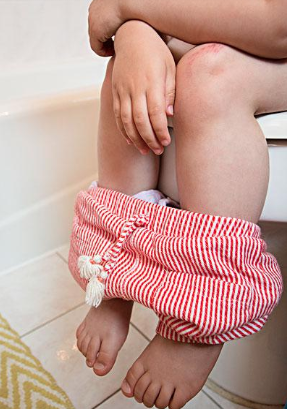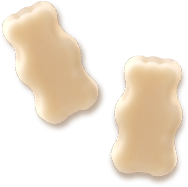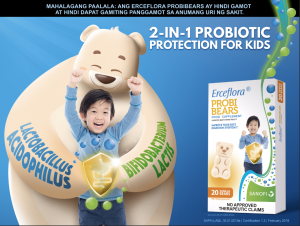These days, almost everyone is obsessed with maintaining and living a healthy lifestyle. Us moms are no stranger to this health revolution. Of course, our families and most especially our kids, are the main beneficiaries as well. This is not surprising at all, as every mom wants the best for her child — especially when it comes to health. But did you know that we are responsible for our child’s health not just from the day they were born, but even before?
Research has found that a baby’s gut flora plays a vital role in his health, from when he’s born until he grows up. And a child’s gut flora is in turn, largely determined by his mom’s microflora, which the child gets during gestation as a fetus, through delivery, and even through skin contact and breastfeeding. But how exactly does the gut flora play a role in a child’s or even in our health?
There are basically three types of flora in our gut, all of which are affected by our age, health, and diet. These are:
- Beneficial flora or the good bacteria, which helps digest the food we eat and keep our gut healthy.
- Opportunistic flora or bad bacteria, which can also be found in the gut but if not managed, might cause certain diseases and affect our health.
- Transitional flora, which can be found in everything we eat and drink. It’s harmless if our gut is healthy, but can cause certain diseases if our gut is weak.
The gut flora affects our health, because:
- Gut flora play a role in our digestion by helping digest the food we eat. They produce enzymes that break down carbohydrates so that our body can absorb the necessary nutrients, vitamins, and minerals. At the same time, Lactobacteria found in the small intestine help digest lactose. While Bifidobacteria in the colon produce B vitamins, regulate bowel movements, and even produce antibiotics to kill bad bacteria.
- Beneficial flora play a role in our immune system by producing useful chemicals that can kill viruses, bacteria, and fungi. At the same time, they can also make it hard for bad bacteria to thrive in the intestine.
Having said these, the next question is, how do we maintain a healthy gut for ourselves and our kids? The answer: probiotics.
What are probiotics?
Simply put, probiotics are live bacteria and yeasts that are good for our health. They are considered and referred to as the “good” and “helpful” bacteria that help keep our gut healthy. Probiotics can help balance the “good” and “bad” bacteria in our bodies to keep it working properly.
Are probiotics safe for our kids?
Probiotics are currently a popular natural remedy for kids and they play a role in keeping our kids’ gut flora healthy. And while further studies on the benefits and risks of probiotics use for kids are still needed, the existing research is promising.

What are the benefits of giving probiotics to kids?
- A pediatric study found that giving probiotics to babies during the first 3 months may help prevent colic, constipation, and acid reflux.
- A certain probiotic strain was also found to be safe and effective in treating infectious diarrhea in kids.
- At the same time, another review found that probiotics can help treat inflammatory bowel disease and reduce gastroenteritis-caused diarrhea.
- The same aforementioned review also stated that pregnant and breastfeeding mothers who take probiotics reduce the risk of eczema and allergies in their kids.
- Several studies have also shown that probiotics can help if your child has a chronic condition such as irritable bowel syndrome, Crohn’s disease, or ulcerative colitis. Certain probiotic strains can reduce severe abdominal pain, gas, bloating, cramping, and/or diarrhea in kids.
How do I give probiotics to my kids?
Probiotics can be found in foods that are fermented, such as yogurt, kefir (fermented probiotic milk drink), sauerkraut (finely shredded cabbage fermented by lactic acid bacteria), tempeh (a fermented soybean product), and kimchi (a fermented spicy Korean dish). Most moms would probably encounter a bit of a problem including these in her kid’s meals (except maybe yogurt). So here are other ways to give probiotics to your kids:
- Offer your kids probiotics-friendly food and snacks that will help nourish the good bacteria in their gut. These include fruits and veggies such as bananas, apples and pickles, yogurt, and even dark chocolate.
- Give your kids a daily probiotic supplement such as Erceflora ProbiBears – The 2-in-1 Probiotic Protection for Kids Tummies.

Erceflora Probibears contains two strains of probiotics: Lactobacillus acidophilus and Bifidobacterium lactis. Bifidobacterium lactis are found in high quantities in the gut of healthy breastfed babies and are associated with the healthy development of their immune system. They are also associated with other health benefits, such as the prevention of diarrhea and the improvement of lactose intolerance. On the other hand, Lactobacillus acidophilus help boost the probiotics’ effect and life in the gut, thereby improving the gut’s health (both sources are the attachments).
At the same time, Erceflora Probibears has a lot of beneficial features:
- Erceflora ProbiBears contain less sugar than other probiotic drinks, which contain around 11.4g of sugar per serving.
- Erceflora Probibears does not contain skimmed milk powder, which can be considered unhealthy as all the nutritious fat content in the milk has been “skimmed off” due to the heat treatment to turn it into powder form.
- Some probiotic drinks also contain dextrose and other artificial sweeteners — which basically means more sugar content.
- Some probiotic drinks undergo ultra-heat treatment and homogenization, both of which destroy milk proteins and molecules, that can, in turn, cause autoimmune issues.

Ultimately, probiotics are good for us and our kids and we should try to incorporate it into our diet as much as possible. But drinking those popular probiotics drinks might not be the healthiest option because of their sugar content. With Erceflora ProbiBears you can get your daily dose of probiotics-friendly food!
* All content in this article should be taken as for informational purposes only and should not be considered as medical advice. Always seek the direct advice of a medical professional for any health issues or concerns.
Published with Erceflora #Probibears.
Other References: About Kids Health, Parents, Healthline, Technical Memorandum on Bifidobacterium lactis BL-04, Technical Memorandum on Lactobacillus acidophilus La-14
ASC Ref No: S009P071218E





